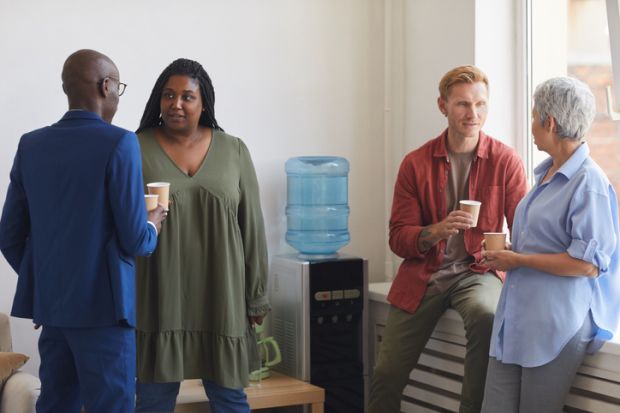Both students and lecturers have much to say on the subject of online learning in these pandemic days. But there are so many other parts of academic life where we are stuck with everything being mediated through a screen.
Sometimes this is helpful, but there are large parts of our professional lives (and I am excluding the social, important though that is on so many fronts) that are negatively impacted by the world being limited to Zoom and its near relatives.
Take committee meetings. In my view, there are some situations in which Zoom (or its various cousins) work even better than in person. The ability to create an organised discussion, with no person able to take over easily, is a great boon.
I’ve never yet been reduced to muting a badly behaved member who attempts to come back again and again in an attempt to dominate everyone else. Nor despatch an unruly attendee to a waiting room, unlike the behaviour exhibited in the viral video that led to Jackie Weaver having her five minutes of fame.
People are pretty well behaved on the whole, raising their electronic hand or waving frantically to catch the chair’s eye if they want to jump in, although there are always moments – particularly in smaller meetings – when several people try to jump in simultaneously and the typical Anglo-Saxon politeness of “after you”, “no, after you” comes into play.
THE Campus resource: Making the implicit explicit
The great loss is the more subtle stuff. Impossible to raise an eyebrow at your pal when Professor X drones on, because how do you know where to direct your gaze on a Zoom grid? Unwise, I fear, to drop a sarcastic message to another attendee through the chat function in case you accidentally send it to everyone. It is, of course, always possible to text or WhatsApp your colleague, since that can’t go astray in the same way, but then you are more obviously not paying attention by squinting at your phone.
The consequences of all this are that the dynamics change. It’s less easy to judge if everyone else is as irritated as you by a certain line of argument when body language is obscured, or gauge how well received your own arguments are when all you can see is a minuscule rectangle containing each colleague in their kitchen, bedroom or, as is so often the case, sat proudly in front of a bookcase.
It’s harder to see if Professor Grumble is tapping their foot with frustration at your carefully considered plans, or predict when Dr Hot Temper is about to explode because they violently disagree with the intended budget. For chair and committee members alike, it all – quite literally – becomes disembodied and, as a direct consequence, a consensus over tricky matters may become harder to achieve.
Even more than what happens around that committee table, we are all losing our tea break chats. I don’t mean a good chair won’t allow time for a tea break, I mean that those proverbial water-cooler moments of touching base, pre-empting trouble or simply forging a relationship with a new colleague are irrevocably lost.
If you are working with people you’ve never met in the real world, it is so much harder to establish a connection with them when they have only existed for you through the screen. I think this is the real loss when it comes to our current world of online meetings − a different problem from those arising from online teaching.
THE Campus resource: Welcoming students to your online environment
I worry that when we finally emerge from these lockdowns, the joy of having never to get on a train, a bus or a plane may mean face-to-face meetings with colleagues and collaborators may not necessarily re-emerge.
There are, of course, benefits − not least to the environment − from staying put. But the loss of nuance delivered across a room, or of getting to know someone in casual encounters so that a solid relationship can be built, will be great. Add the inability to explore the potential pitfalls of your latest bright idea in passing over that cup of tea, rather than through an explosion mediated through a screen. All of these – if not recovered in due course – would make the workings of academia harder, not easier.
We are social animals; we were not designed to operate by sitting at a screen for hours every day attempting to transact “normal business”. I look forward to the day when I can once more snatch a quiet word in a corner with either ally or enemy to move a debate forward. And when I can alleviate the boredom of some parts of higher education life by raising that eyebrow across a room, not Zoom. Roll on real life.
Dame Athene Donald is professor of experimental physics at Churchill College, University of Cambridge.
Register to continue
Why register?
- Registration is free and only takes a moment
- Once registered, you can read 3 articles a month
- Sign up for our newsletter
Subscribe
Or subscribe for unlimited access to:
- Unlimited access to news, views, insights & reviews
- Digital editions
- Digital access to THE’s university and college rankings analysis
Already registered or a current subscriber?






